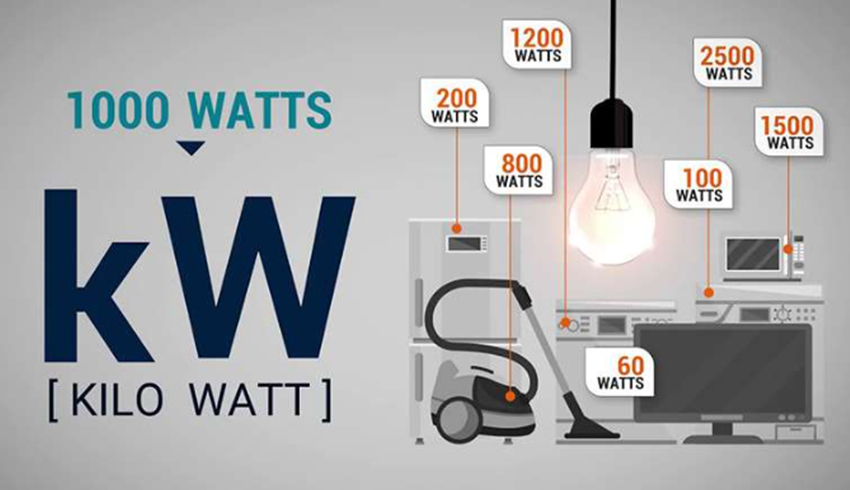مع انتباه القضايا البيئية وأزمة الطاقة, لقد تطورت صناعة الطاقة الشمسية بسرعة. خضعت تكنولوجيا الطاقة الشمسية للعديد من الابتكارات التكنولوجية, لا ينطبق فقط على الصناعة والتجارة, ولكن أيضا شعبية للمنزل, أطلقت أنظمة وملحقات منزلية. يبدأ المزيد والمزيد من الناس في الانتباه إلى أنظمة توليد الطاقة الشمسية وشرائها, والمعرفة الكهربائية ذات الصلة تحتاج إلى زيادة.

هذا المقال ستقدمك إلى KW إلى KWH, , اشرح لماذا تحتاجه, المعنى المحدد لكل مصطلح في الصيغة, وفهم محول KW إلى KWH.
ما هو كيلووات (كيلوواط)?
كيلووات هو مقياس للسلطة. عادة ما يتم استخدامه لوصف الطاقة التي يستهلكها نظام كهربائي على مدى فترة زمنية معينة. أكبر قيمة كيلووات, كلما زاد استهلاك النظام الكهربائي, وكلما كانت القيمة أصغر على العكس.

كيلوواتس تقع بين واتس وميجاوات, مما يجعلها وحدة رئيسية لتوليد الطاقة داخل أنظمة الألواح الشمسية. لذلك, من الأهمية بمكان لأي شخص يريد أن يفهم أنظمة الألواح الشمسية لإتقان مفهوم كيلوواتس.
ما هو كيلووات ساعة (كيلووات ساعة)?
أ كيلووات ساعة هي وحدة الطاقة التي تقيس كمية الطاقة التي يستخدمها النظام الكهربائي لأداء وظيفة محددة. كلما ارتفعت قيمة كيلووات ساعة, كلما زاد استهلاك الجهاز, على العكس تماما, أصغر قيمة كيلووات ساعة, كلما قلت الطاقة التي يستهلكها الجهاز.

كوحدة رئيسية لقياس استهلاك الطاقة المنزلية, لا يتم استخدام كيلووات ساعة فقط لحساب الطاقة التي توفرها لوحة شمسية الأنظمة على أساس يومي والطاقة التي تستهلكها الأجهزة المنزلية في التشغيل اليومي. تساعد طريقة القياس هذه على توحيد تسعير تثبيت نظام الطاقة, يستخدم, ومبيعات الطاقة.
الفرق بين KW و KWH
الشروط كيلووات ساعة (كيلووات ساعة) و Kilowatt (كيلوواط) يبدو مشابهًا وغالبًا ما يتم الخلط بينه, والتي يمكن أن تجعل فهم ما يعنيه صعب. في الحقيقة, هم مترابطون, والتغيرات في أحدها تؤثر على الآخر.

الفرق الرئيسي بين الاثنين هو أن KWH يمثل إجمالي كمية الكهرباء المستهلكة على مدار فترة زمنية, بينما يمثل KW الاستخدام الفوري للكهرباء. على الرغم من أن المصطلحات "القوة" و "الطاقة" غالباً ما تستخدم بالتبادل بالتبادل, من وجهة نظر فنية, KWH هي وحدة قياس الطاقة و KW هي وحدة قياس الطاقة.
لماذا KW و KWH مهمان?
يعد فهم الفرق بين Kilowatts و Kilowatt-Hours أمرًا بالغ الأهمية لإدارة استخدام الطاقة بفعالية. يمكن أن يساعدك ذلك في رؤية استهلاك الطاقة المطلوب من قبل الأجهزة والمعدات وتقدير كمية الطاقة التي ستستخدمها على مدار فترة زمنية معينة.
على سبيل المثال, إذا كنت تريد معرفة المدة التي تستغرقها شحن سيارة كهربائية, يمكنك مضاعفة إخراج KW للشاحن بواسطة KWH التي تتطلبها بطارية السيارة.
من المهم أيضًا للأشخاص الذين يحتاجون إلى الألواح الشمسية وأنظمة تخزين الطاقة لفهم هذه المصطلحات, لأنها تستخدم على نطاق واسع في الصناعة. يعد فهم احتياجات الطاقة والطاقة الخاصة بك أمرًا ضروريًا لاختيار حل الطاقة الشمسية والتخزين الصحيح.
كيفية تحويل KW إلى KWH?
بعد فهم تعريفات KW و KWH, يمكننا أن نبدأ في معرفة كيفية حساب محول KW إلى KWH. نظرًا لأن KW و KWH لا ينتميان إلى نفس وحدة قياس الكميات المادية, من الضروري تقديم كمية مادية وسيطة - الوقت (تي) من أجل تحقيق التحويل بينهما. بهذه الطريقة, يمكننا فهم علاقة التحويل بينهما.

صيغة التحويل هي كما يلي: ه (كيلووات ساعة) = ص (كيلوواط) x ر (ساعات)
شرح مفصل لهذه الصيغة:
تمثل E مقدار الطاقة التي يستهلكها الجهاز في فترة زمنية معينة, تقاس بالكيلووات/ساعة (كيلووات ساعة).
تمثل P القدرة التشغيلية للجهاز في Kilowatts (كيلوواط).
T يرمز إلى وقت تشغيل الجهاز, في ساعات.
باختصار, kwh = kilowatts x ساعات
مثال محول KW إلى KWH
لتوضيح مدى بساطة هذه الصيغة للاستخدام, دعنا نمر بحالة عملية يواجهها مستخدمو الألواح الشمسية في كثير من الأحيان. أولاً, سنعرض لك كيفية تحويل KW إلى KWH.
دعنا نقول أن لدينا نظام لوحة شمسية مع إخراج من 20 KW الذي يركض ل 5 ساعات في اليوم. لحساب إجمالي استهلاك الطاقة (في KWH), نحن ببساطة نقوم بتوصيل القيمة المحددة في الصيغة.
كيلووات ساعة = 20 كيلوواتس x 5 ساعات
النتيجة هي 100 كيلوواط ساعة, وهو إجمالي استهلاك الطاقة الخاص بك نظام الطاقة الشمسية في يوم واحد.

باستخدام هذه النتيجة, يمكنك زيادة حساب استهلاك الطاقة الشهري لنظام الطاقة الشمسية الخاص بك لفهم مقدار الطاقة التي يتم إطلاق نظام اللوحة الشمسية الخاصة بك كل شهر.
يتم تحويل KWH إلى KW
فضلاً عن ذلك, باستخدام هذه الصيغة البسيطة, يمكنك أيضًا تحويل KWH إلى KW, فقط من خلال إعطاء KWH ووقت استخدام الجهاز المحدد. على سبيل المثال, لديك نظام شمسي مع قراءة استهلاك الطاقة من 80 KWH ووقت تشغيل 4 ساعات.
كل ما عليك فعله هو توصيل هذه القيم في الصيغة وضبطها بحيث يصبح كيلووات هو المتغير الأساسي.

الصيغة الجديدة كما يلي:
KW = KWH/ساعة
نحن ببساطة جلب 80 KWH في الصيغة وتقسيم 4 ساعات للحصول عليها 20 كيلوواط من إخراج الطاقة.
هذه هي كيفية التحويل بسرعة بين كيلوواتس (كيلوواط) و Kilowatt ساعة (كيلووات ساعة) باستخدام صيغتنا البسيطة.
ملخص حاسبة KW إلى KWH
في مجال الألواح الشمسية, التحويل الكهربائي وحسابهم ليسوا معقدين كما هو موضح في الأدلة الكهربائية. بمجرد أن تفهم المتغيرات المشاركة في المعادلة, تصبح هذه الحسابات سهلة بشكل مدهش.
إذا كان لا يزال لديك أسئلة حول مفهوم التحويل الشمسي, أو تحتاج إلى مزيد من التوجيه, يرجى زيارة جيكس سولار, نحن نقدم أي مساعدة إضافية من اختيار الألواح الشمسية إلى إكمال التثبيت.
